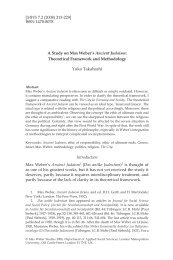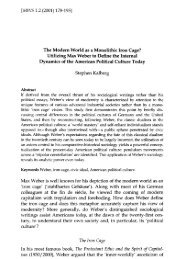Disenchantment, Enchantment and Re ... - Max Weber Studies
Disenchantment, Enchantment and Re ... - Max Weber Studies
Disenchantment, Enchantment and Re ... - Max Weber Studies
You also want an ePaper? Increase the reach of your titles
YUMPU automatically turns print PDFs into web optimized ePapers that Google loves.
26 <strong>Max</strong> <strong>Weber</strong> <strong>Studies</strong><br />
the computer industries. However one reads it, this is a different<br />
species of disenchantment.<br />
As might have been expected, the Millennium has been a stimulus<br />
to religious enthusiasm, revival <strong>and</strong> foreboding. This, after all, is what<br />
Christian Millennia are all about. Here one can see a combination of<br />
apocalyptic millenarianism <strong>and</strong> evangelical fervour leading to a range<br />
of potential excesses. <strong>Enchantment</strong> <strong>and</strong> (re)enchantment are at the<br />
heart of it. Among the more scary groups that poked their collective<br />
heads over the parapet were the Concerned Christians of Denver, Colorado<br />
(deported during 1999 from Israel, accused of plotting Millennial<br />
violence to hasten Christ’s Second Coming), <strong>and</strong> the Russian<br />
Church of the Final Testament. Nor has all of this apocalyptic activity<br />
been Christian: witness the genuinely global—if, from a detached viewpoint,<br />
somewhat risible—fascination with Nostradamus, <strong>and</strong> the<br />
activities of groups such as Sukyo Mahikari <strong>and</strong> the House of Yahweh<br />
(for further examples of late twentieth-century apocalyptic millennarianism,<br />
see Lamy [1997], Robbins <strong>and</strong> Palmer [1997], Strozier <strong>and</strong><br />
Flynn [1997], <strong>and</strong> Thompson [1996]). Touch wood, so far, the apocalypse<br />
has, of course, been postponed. Nor has all the Millennial religious<br />
activity been apocalyptic, anyway. The Pontiff’s dedication of<br />
the year 2000 as a Jubilee for Catholics globally may yet, particularly<br />
at a time when the papal succession is openly, <strong>and</strong> most unusually, a<br />
topic for public discussion, turn out to be the most significant<br />
Christian expression of the Millennium.<br />
Turning our attention from the sacred to the profane, it was always<br />
to be expected that the Millennium would be an opportunity for commercial<br />
exploitation on a gr<strong>and</strong> scale. This takes in everything from<br />
the proofing of computer systems against Y2K failures, as already<br />
mentioned, to special turn-of-the-millennium package holidays, to the<br />
use of the Millennium as a trademark <strong>and</strong> logo, <strong>and</strong> so on. One of the<br />
more entertaining examples could be found in the autumn of 1999’s<br />
Egyptian tourism advertising campaign, extolling Egyptian civilization’s<br />
celebration of its seventh millennium. Less exotically, this<br />
category also included negotiations about special rates of pay for<br />
those working on Millennium Eve <strong>and</strong> disputes over the prices that<br />
were charged for food, drink <strong>and</strong> entertainment on the night.<br />
On the one h<strong>and</strong> there is evidence of the use of enchantments of<br />
whatever sort as marketing devices <strong>and</strong> strategies (something which<br />
we have also seen in politics). On the other h<strong>and</strong>, enchantments—no<br />
less than idols—can often be guaranteed to be clay up to at least the<br />
knee. The money-lenders have always had a business eye on the Temple.<br />
Most optimistically, perhaps, the commercial side of the Millen-




